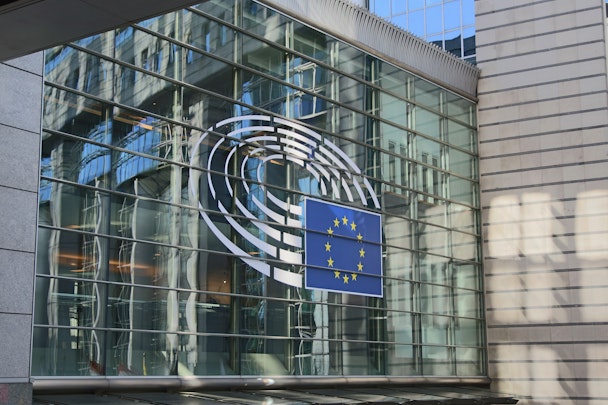What the EU’s rule change means for brands claiming to be ‘carbon neutral’ via offsetting
The pending legislation could spell problems for some advertisers.

The EU parliament has stood behind the anti-greenwashing bill / Unsplash
Last week, the EU parliament voted in favor of new anti-greenwashing laws that will see a major clampdown on brands making environmental claims without substantiation.
The move begins the process of enshrining in law restrictions around claims on consumer labels and what terms companies can and cannot use without providing evidence. Crucially, it includes a ban on environmental claims like ‘carbon neutral’ being used where companies are offsetting their emissions using carbon credits – a move that was left out of earlier drafts, to much criticism.
The effectiveness of carbon offsetting as a means of reducing climate impact has long been disputed by scientists, and the practice has fallen under increased scrutiny in recent months after an investigation by The Guardian revealed carbon credits sold by the world’s biggest supplier were invalid.
Advertisement
But around the world and across the EU, brands have been relying on carbon offsetting to meet their net-zero targets and communicate them to their customers may be having to reconsider their European messaging. For example, a 2021 campaign by Nestle for KitKat, explains just how carbon offsetting factors into its plans to make the chocolate bar carbon neutral by 2025.
First movers in the area will have already started to roll back their offsetting strategies to focus on reducing emissions across their supply chain. In 2022, the airline EasyJet announced it would no longer be offsetting the emissions of its flights, instead focusing on sustainable fuel and plane efficiency.
Advertisement
While European brands, including Ace & Tate and Klarna, tell The Drum they have already taken pains to reconsider the relationship with offsetting and set sights on carbon reduction across the supply chain ahead of regulatory crackdowns.
As Jake Dubbins, co-chair of the Conscious Advertising Network says the EU’s move can’t have caught that many companies by surprise, “but advertising is coming to addressing the climate crisis quite late, and things are now moving at a rapid pace.”
He adds that he hopes the move by the EU will challenge brands to meaningfully decarbonize in order to bring their sustainability claims into compliance, rather than falling silent on their strategies by ‘greenhushing.’
Suggested newsletters for you
While Blake Harrop, president of Wieden+Kennedy Amsterdam says increased regulation should be viewed as a commercial incentive to brands and agencies to do better, commenting “We’re really happy to see legislators in the EU put stricter guidelines in place for sustainability messaging. If all brands can claim they’re green, then you remove the incentive to win consumers based on superior commitments to the environment. This will hopefully make being an environmentally responsible brand even better for business, and will challenge brands in Europe to lead the way.”
In the UK, an investigation by the ASA into the use of terms like ‘carbon neutral’ and ‘net zero’ is ongoing after the regulator identified that consumers often feel misled when they realize the role offsetting plays in brands making the claims.
As Geraint Lloyd-Taylor, a partner in advertising law at legal firm Lewis Silkin explains to The Drum, if the EU law comes to pass, there’s every chance it could put pressure on the UK regulator to enact similar changes. “The ASA will conduct further research in this area this year, but it will be looking very closely at these latest developments in the EU. If a de facto (or actual) ban on the use of these terms is introduced in the EU when they are based on carbon offsetting rather than carbon reduction, it is entirely possible the UK regulators will follow suit,” he says.
Moreover, industry bodies including Ad Net Zero already advise against the practice, with a spokesperson telling The Drum, “Ad Net Zero believes reduction must always come before carbon offsetting. Some emissions are unavoidable or residual because the technology or alternative processes do not exist. If you really must offset, then seek a credible and permanent carbon removal scheme, but limit this to no more than 10% of your total emissions.
“We strongly encourage practitioners to closely follow the guidelines set by regulators and to take advantage of the Ad Net Zero Training which has a module on understanding the rules around making environmental claims and ensuring they are substantiated.”
With anti-greenwashing regulation picking up a rapid pace across the regions, brands with sustainability at the center of their business model will have moved ahead of compliance. For the laggers, there is a closing window of time to implement compliant communications or risk falling foul.
Want to learn more about the most important issue of our time? Senior reporter Ellen Ormesher will explore the role of advertising and marketing in the climate crisis. Case studies, tips, interviews and more. Register your interest here.

